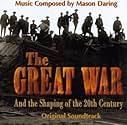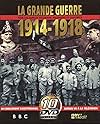Füge eine Handlung in deiner Sprache hinzuA unique first-person narrative, sewn together from genuine testimonies of frontline soldiers.A unique first-person narrative, sewn together from genuine testimonies of frontline soldiers.A unique first-person narrative, sewn together from genuine testimonies of frontline soldiers.
- 2 Primetime Emmys gewonnen
- 5 Gewinne & 1 Nominierung insgesamt
Folgen durchsuchen
Empfohlene Bewertungen
10bolobill
I can't really add to the other reviews. This is one of the best documentaries I've seen, and the best on this subject. It really was a case of lions being led by donkeys. I am including a poem by Wilfred Owen (killed a few days before the end of the war in a meaningless assault) that sums up what happened:
The Parable of the Old Man and the Young
So Abram rose, and clave the wood, and went, And took the fire with him, and a knife. And as they sojourned both of them together, Isaac the first-born spake and said, My Father, Behold the preparations, fire and iron, But where the lamb, for this burnt-offering? Then Abram bound the youth with belts and straps, And builded parapets and trenches there, And stretchèd forth the knife to slay his son. When lo! an Angel called him out of heaven, Saying, Lay not they hand upon the lad, Neither do anything to him, thy son. Behold! Caught in a thicket by its horns, A Ram. Offer the Ram of Pride instead.
But the old man would not so, but slew his son, And half the seed of Europe, one by one.
The Parable of the Old Man and the Young
So Abram rose, and clave the wood, and went, And took the fire with him, and a knife. And as they sojourned both of them together, Isaac the first-born spake and said, My Father, Behold the preparations, fire and iron, But where the lamb, for this burnt-offering? Then Abram bound the youth with belts and straps, And builded parapets and trenches there, And stretchèd forth the knife to slay his son. When lo! an Angel called him out of heaven, Saying, Lay not they hand upon the lad, Neither do anything to him, thy son. Behold! Caught in a thicket by its horns, A Ram. Offer the Ram of Pride instead.
But the old man would not so, but slew his son, And half the seed of Europe, one by one.
This documentary does a very difficult feat: not simply to tell history as it was but also give the viewer a sense of the Great War and its consequences. The story is so powerful it leaves the viewers shocked and saddened. And that's the only way a documentary about a war should give you - a lesson so that we will never engage in a similar war. Sadly, we often talk about history in a detached and distant way without contextualizing it. That's why this documentary does such a great job. It should not only be rereleased and sold but also mandatory viewing in school. It takes some time to go through all the episodes and linked with discussions after each episode would allow for a highly valuable educational experience.
If you're going through your decaying collection of VHS tapes or DVD's, this is worth a final decay! I have seen thousands of documentaries and am a huge fan of the genre. Recently a friend offered me a pile of DVD's from her collection and as I can only remember my Belgian (Ghent) grand-mother's stories of this war I was hoping for some more information. I guess I feel a bit more informed but at a cost. This is precisely how a documentary should not be made! Focussed on sensation and drama, with plenty of full moon shots, candle lights and flames throughout the series, not to forget explosions. The worst is the soundtrack, never ceasing dramatic music every single second. It only stops briefly during some interviews with unidentified people. Judi Dench's voice is completely drained in it. Furthermore I am wondering how she felt about what she was reading out loud... Bad, a waste and a totally missed opportunity!
10NEWS4A2
This movie is one of the only reasons I finally broke down and bought a VHS-DVD dubbing recorder. Bar none, it is the best documentary ever produced on World War I. And I've been worried the VHS tape would dry-rot and crinkle and prevent my future enjoyment of this masterpiece.
From the all-star cast for the voice-over work to the beautifully restored vintage video to its hauntingly eerie soundtrack to its historically exacting accuracy and insightful commentary, there is absolutely nothing negative I can say about this documentary other than it's a shame it's not out on DVD, in the classrooms and libraries and available for future generations.
If you're lucky, you'll find a vintage VHS copy on one of the auction sites but be prepared to pay for the privilege of ownership. I've seen used sets sell for $300 and more. But, honestly, it would be worth the price in either the 4 2-hour tape or the 8 1-hour tape versions.
From the all-star cast for the voice-over work to the beautifully restored vintage video to its hauntingly eerie soundtrack to its historically exacting accuracy and insightful commentary, there is absolutely nothing negative I can say about this documentary other than it's a shame it's not out on DVD, in the classrooms and libraries and available for future generations.
If you're lucky, you'll find a vintage VHS copy on one of the auction sites but be prepared to pay for the privilege of ownership. I've seen used sets sell for $300 and more. But, honestly, it would be worth the price in either the 4 2-hour tape or the 8 1-hour tape versions.
If you have eight hours to spare and are interested in learning the truth (or as close to it as modern historians can get to it) about World War One, I'd recommend watching the PBS documentary The Great War: 1914-1918. The United States version was given a different subtitle "And the Shaping of the Twentieth Century" which was very apt. The eight-part miniseries showed how nothing was the same after the war, leading the path to modern society and modern warfare. Also, in the American version, there was a different narrator (but how I would have loved to have heard Judi Dench instead!) Salome Jens's voice was quite irritating, and I'm sure Miss Dench would have been much more soothing.
However, there are lots of other voices you'll get to hear. It's a lot of fun to perk up your ears and try to guess who they are. The regulars are Jurgen Prochnow, Michael York (but don't listen for an Englishman...), Leslie Caron, Ian Richardson, Jeremy Irons, Ralph Fiennes, Tim Pigott-Smith, Martin Landau, Malcom McDowell, Liam Neeson, Jeroen Krabbé, Kai Wulff, Rupert Graves, and David Keith. Those who lent their voices to only one or two episodes are Hellen Mirren, Natasha Richardson, Helena Bonham Carter, Rene Auberjonois, Louis Gossett Jr., Timothy Bottoms, Nastassja Kinski, Imogen Stubbs, Jean Stapleton, Jane Leeves, Ned Beatty, Martin Sheen, and countless others. This is an A+ production that was an incredible labor of love for all involved. I couldn't believe the amount of footage that was available (and in good enough quality to use). Although this series mirrors the format of the great Ken Burns documentaries, with historians being interviewed, most of the visuals you'll see in The Great War is actual video footage from the war or the homefront. It's incredible.
It's also incredible to learn the truth that you weren't taught in school. Neither my mother, I, nor my nieces were taught the true nature of the start of WWI. We were taught that Germany was always a bully who wanted to take over the world, and so they started two world wars. That's not what happened! They were merely allies who got roped in, just like all the other countries. The documentary also explained the start of the anti-German propaganda that started during the war, which was really shocking. The series itself still suffered from a bit of lasting western bias; in one notable case, the narrator declared that the French suffered a devastating loss of 400,000 lives after one battle. "German losses were similar." Well, then if they were similar, why wouldn't the narrator declare that both sides suffered devastating losses? Still, my admiration goes out to the creators of this documentary to daring to expose the truth.
True historians might be bored, but the average person will undoubtedly be riveted and shocked. I tried recommending it to my brother by enticing him with a few facts I'd learned. Instead of being surprised as I'd been, he merely finished the stories for me and added even more historical tidbits that even the documentary didn't include! But he's a genius. For the rest of us, we can learn a lot by watching The Great War.
However, there are lots of other voices you'll get to hear. It's a lot of fun to perk up your ears and try to guess who they are. The regulars are Jurgen Prochnow, Michael York (but don't listen for an Englishman...), Leslie Caron, Ian Richardson, Jeremy Irons, Ralph Fiennes, Tim Pigott-Smith, Martin Landau, Malcom McDowell, Liam Neeson, Jeroen Krabbé, Kai Wulff, Rupert Graves, and David Keith. Those who lent their voices to only one or two episodes are Hellen Mirren, Natasha Richardson, Helena Bonham Carter, Rene Auberjonois, Louis Gossett Jr., Timothy Bottoms, Nastassja Kinski, Imogen Stubbs, Jean Stapleton, Jane Leeves, Ned Beatty, Martin Sheen, and countless others. This is an A+ production that was an incredible labor of love for all involved. I couldn't believe the amount of footage that was available (and in good enough quality to use). Although this series mirrors the format of the great Ken Burns documentaries, with historians being interviewed, most of the visuals you'll see in The Great War is actual video footage from the war or the homefront. It's incredible.
It's also incredible to learn the truth that you weren't taught in school. Neither my mother, I, nor my nieces were taught the true nature of the start of WWI. We were taught that Germany was always a bully who wanted to take over the world, and so they started two world wars. That's not what happened! They were merely allies who got roped in, just like all the other countries. The documentary also explained the start of the anti-German propaganda that started during the war, which was really shocking. The series itself still suffered from a bit of lasting western bias; in one notable case, the narrator declared that the French suffered a devastating loss of 400,000 lives after one battle. "German losses were similar." Well, then if they were similar, why wouldn't the narrator declare that both sides suffered devastating losses? Still, my admiration goes out to the creators of this documentary to daring to expose the truth.
True historians might be bored, but the average person will undoubtedly be riveted and shocked. I tried recommending it to my brother by enticing him with a few facts I'd learned. Instead of being surprised as I'd been, he merely finished the stories for me and added even more historical tidbits that even the documentary didn't include! But he's a genius. For the rest of us, we can learn a lot by watching The Great War.
Wusstest du schon
- VerbindungenFeatures Die Schlacht an der Somme (1916)
Top-Auswahl
Melde dich zum Bewerten an und greife auf die Watchlist für personalisierte Empfehlungen zu.
- How many seasons does The Great War: 1914-1918 have?Powered by Alexa
Details
- Farbe
- Sound-Mix
- Seitenverhältnis
- 1.33 : 1
Zu dieser Seite beitragen
Bearbeitung vorschlagen oder fehlenden Inhalt hinzufügen

































